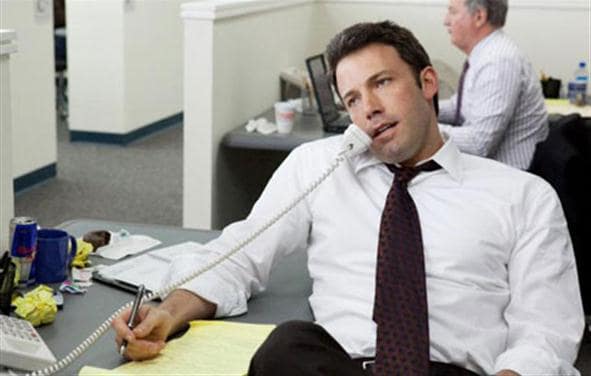Eye For Film >> Movies >> The Company Men (2010) Film Review
The Company Men
Reviewed by: Andrew Robertson

Three white, male, middle-class executives stop working for a fictional corporation. All of them have served the organisation for more than seven years. One came up through the ranks from sales, one came up to the boardroom from the factory floor, and one helped found the company. One's petulant and in denial and Ben Affleck, one's drunk and grief-stricken and Chris Cooper, and one's distant and having an affair and Tommy Lee Jones. None elicit sympathy. Or, at least, Affleck as Bobby Walker doesn't, because he's Ben Affleck.
These imaginary people have better imaginary jobs and imaginary lives than you do, than I do, than almost anyone real does. They've got six figure salaries, Porsches, beach houses, stock options. The company gives them generous severance packages that run to three months salary with benefits and more. It pays for 'out placement', which is a place where you get a telephone, internet access, job-seeking advice and the chance to meet Eamonn Walker, an actor who's been in a lot of good television, a few good films, and is probably better than this film deserves.

So, the all-star cast lose their all star jobs, over a period of months, admittedly, punctuated by difficulty: with Walker's brother-in-law, played by Kevin Costner; with chief executive James Salinger, played by veteran actor Craig T Nelson; with human resources chief Sally Wilcox, played by Maria Bello.
Among these executives, with their two-car garages and leased sports cars, Costner is a carpenter, renovating houses. He's actually not bad, but he's still not Harrison Ford no matter how hard he tries. He's the older brother of Rosemarie DeWitt, who herself does a credible job opposite Affleck. The 'siblings' 19-year age difference isn't remarked upon, but it's another potentially interesting background detail that the film glosses over.
This film is about these three men, and everything else is for their benefit. Even the environments reflect a particular lack of awareness and status consciousness - these are men surrounded by things, and some of those things are women. There's a streak of misogyny, most clearly expressed in the phone calls that Walker makes to Wilcox, the woman who fired him - one a day, at least, and usually involving name-calling or worse. At one point she mentions a restraining order, and it's ludicrous that a company trying to divest itself of costs wouldn't cut off his out-placement and 'transition arrangements' given the opportunity. As Wilcox, Bello is pretty good, but she's mostly called upon to fire some folk and have an affair with benevolent patrician-type Tommy Lee Jones. She's probably better than the film deserves, indeed, most of the cast are, and all the film's weaknesses can be traced to the script.
John Wells writes and directs. He's done a tremendous amount of television, a lot of which is very good, including shows such as ER and The West Wing. He's also done a lot of production, with roles behind the people behind the camera on One Hour Photo and The Peacemaker among others. This is his cinematic debut and it's not very good. It's well directed, certainly, but even if most of the cast weren't phoning it in they would have real difficulty eliciting sympathy. There might be something in the fact that their amazing jobs have distracted them from underlying problems in their marriages, but the film is so self-centred on their behalf that one cannot be certain that reading is intended.
Events in the film are driven by the stock price, and that makes it hard not to compare it with Boiler Room. Affleck's role in that film was a star turn, admittedly channeling Alec Baldwin in Glengarry Glen Ross, but still compelling. The whole job-loss thing recalls Roger And Me, and the middle-class regret suggests The Ice Storm. All those comparisons put The Company Men in a further bad light. It's a shame, because of the calibre of those involved, but as a failed portrait of economic distress this is on a par with Wall Street: Money Never Sleeps - a mismatch of intent and execution that feels like an effort to take money from the audience's pockets for poor return.
The Company Men manages to go one further by making its characters almost entirely unsympathetic, either in action or status. With their million-dollar homes, their $17,500 end-tables, their wives who don't understand them and their frequent unwillingness to consider others, it's a mess.
In fairness, both Costner and Jones have turns that suggest there might have been a moral core in the film, and Affleck's journey does bring him closer to their viewpoint - the responsibility of Capital to man, the joy of work, though further extension would require a greater diversion into Marxist-Leninist dialectic. In practice, such meditations on men versus business are better expressed in films such as The Godfather. It may be that there was enough here for a television series and in compression to the bigger screen subtleties were lost. That's not to excuse it - despite how pretty it looks, this is effectively a film about how rubbish it is that people who fly Business Class at a minimum have lost their jobs. There isn't the meditation on modern work or the business of downsizing that informs Up In The Air, and the speech in praise of manual labour and a job well done comes across as patronising; in fact, the whole film does.
The Company Men attempts to remind us that losing a job is an unpleasant and difficult experience, but largely manages to be that way itself.
Reviewed on: 10 Mar 2011


















